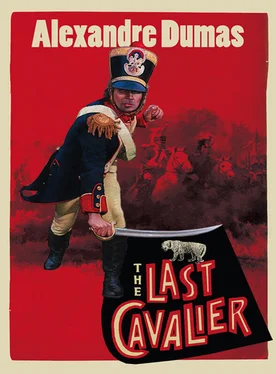Everyone was looking at the wine merchant, and, we must say, he was up to the task as he courteously answered all the questions put to him.
“So, Citizen,” asked a heavyset man whose tall, skinny, shriveled-up wife was pressing up against him, pale and trembling in fear, so much so that you could almost hear her bones knocking together. “You say that the robbery took place on the road we’ve just taken?”
“Yes, Citizen. Between Lambesc and Pont-Royal, did you notice a place where the road climbs between two hills, a place where there are many rocks?”
“Oh, yes, my friend,” the woman said, holding tight to her husband’s arm. “I did see it, and I even said, as you must remember, ‘This is a bad place. I’m glad we’re coming through during the day and not at night.’”
“Oh, madame,” said a young man whose voice exaggerated the guttural pronunciation of the time and who seemed to exercise a royal influence on the conversation of the common table, “you surely know that for the gentlemen called the Companions of Jehu there is no difference between day and night.”
“Indeed,” said the wine merchant, “it was in full daylight, at ten in the morning, that we were stopped.”
“How many of them were there?” the heavyset man asked.
“Four of them, Citizen.”
“Standing in the road?”
“No, they appeared on horseback, armed to the teeth and wearing masks.”
“That is their custom, that is their custom,” said the young man with the guttural voice. “And then they must have said, did they not?, ‘Don’t try to defend yourselves, and no harm will come to you. All we are after is the government’s money.’”
“Word for word, Citizen.”
“Yes,” continued the man who seemed to have all the information. “Two of them got down, handed their bridles to their companions, and asked the coachman to give them the money.”
“Citizen,” the large man said in amazement, “you’re telling the story as if you had witnessed it yourself!”
“Perhaps the gentleman was there,” said Roland.
The young man turned sharply toward the officer. “I don’t know, Citizen, if you intend to be impolite with me. We can speak about that after dinner. But, in any case, I am pleased to say that my political opinions are such that, unless you were intending to insult me, I would not consider your suspicion as an offense. However, yesterday morning at ten o’clock, when those gentlemen were stopping the stagecoach four leagues away, these gentlemen here can attest to the fact that I was having lunch at this very table, between the same two citizens who at this moment are doing me the honor of sitting at my right and my left.”
“And,” Roland continued, speaking this time to the wine merchant, “how many of you were in the stagecoach?”
“There were seven men and three women.”
“Seven men, not counting the coachman?” Roland repeated.
“Of course,” the man from Bordeaux answered.
“And with eight men you let yourself be robbed by four bandits? I congratulate you, monsieur.”
“We knew whom we were dealing with,” the wine merchant answered, “and we were not about to try to defend ourselves.”
“What?” Roland replied. “But you were dealing with brigands, with bandits, with highway robbers.”
“Not at all, since they had introduced themselves.”
“They had introduced themselves?”
“They said, ‘We are not brigands; we are the Companions of Jehu. It is useless to try to defend yourselves, gentlemen; ladies, don’t be afraid.’”
“That’s right,” said the young man at the common table. “It is their custom to let people know, so there can be no mistake.”
“Well,” Roland continued, while Bonaparte kept silent, “who is this citizen Jehu who has such polite companions? Is he their captain?”
“Sir,” said a man whose clothing looked very much like that of a secular priest, and who seemed to be a resident of the city as well as a regular at the common table, “if you were more acquainted than you seem to be in reading Holy Scripture, you would know that this citizen Jehu died some two thousand six hundred years ago, so that consequently, at the present time, he is unable to stop stagecoaches on the highway.”
“Sir priest,” Roland said, “since, in spite of the sour tone you are currently using with me, you seem to be well educated, allow a poor ignorant man to ask for some details about this Jehu who died twenty-six hundred years ago but is nevertheless honored by having companions who carry his name.”
“Sir,” the man of the church answered in the same clipped tone, “Jehu was a king of Israel, consecrated by Elisha on the condition that he punish the crimes of the house of Ahab and Jezebel and that he put to death all the priests of Baal.”
“Sir priest,” the young officer laughed, “thank you for the explanation. I have no doubt that it is accurate and certainly very scholarly. Except I have to admit that it has taught me very little.”
“What do you mean, Citizen?” said the regular customer at the table. “Don’t you understand that Jehu is His Majesty Louis XVIII, may God preserve him, consecrated on the condition that he punish the crimes of the Republic and that he put to death all the priests of Baal—that is, all the Girondins, the Cordeliers, the Jacobins, the Thermidorians; all those people who have played any part over the last seven years in this abominable state of affairs that we call the Revolution!”
“Well, sure enough!” said Roland. “Indeed, I am beginning to understand. But among those people the Companions of Jehu are supposed to be fighting, do you include the brave soldiers who pushed the foreigners back out of France and the illustrious generals who led the armies in the Tyrol, the Sambre-et-Meuse, and Italy?”
“Yes. Those men, and especially those men.”
Roland’s eyes grew hard, his nostrils dilated, he pinched his lips and started to stand up. But his companion grabbed his coat and pulled him back down, and the word “fool,” which he was about to throw in the face of his interlocutor, stayed between his teeth.
Then, with a calm voice, the man who had just demonstrated his power over his companion spoke for the first time. “Citizen,” he said, “please excuse two travelers who have just come from the ends of the earth, as far away as America or India, who have been out of France for two years, who don’t know what’s happening here, and who are eager to learn.”
“Tell us what you would like to know,” the young man asked, apparently having paid only the slightest attention to the insult Roland had been about to spit at him.
“I thought,” Bonaparte continued, “that the Bourbons were completely reconciled to exile. I thought the police were sufficiently well organized to keep bandits and robbers off the highways. And finally, I thought that General Hoche had completely pacified the Vendée.”
“But where have you been? Where have you been?” said the young man with a loud laugh.
“As I told you, Citizen, at the ends of the earth.”
“Well, then. Let me help you understand. The Bourbons are not rich; the émigrés, whose property has been sold, are ruined. It is impossible to pay two armies in the West and to organize one in the Auvergne mountains without any money. So the Companions of Jehu, by stopping stagecoaches and pillaging the coffers of our tax officers, have set themselves up as tax collectors for the Royalist generals. Just ask Charette, Cadoudal, and Teyssonnet.”
“But,” ventured the Bordeaux wine merchant, “if the gentlemen calling themselves the Companions of Jehu are only after the government’s money.…”
“Only the government’s money, not anyone else’s. Never have they robbed an ordinary citizen.”
Читать дальше












